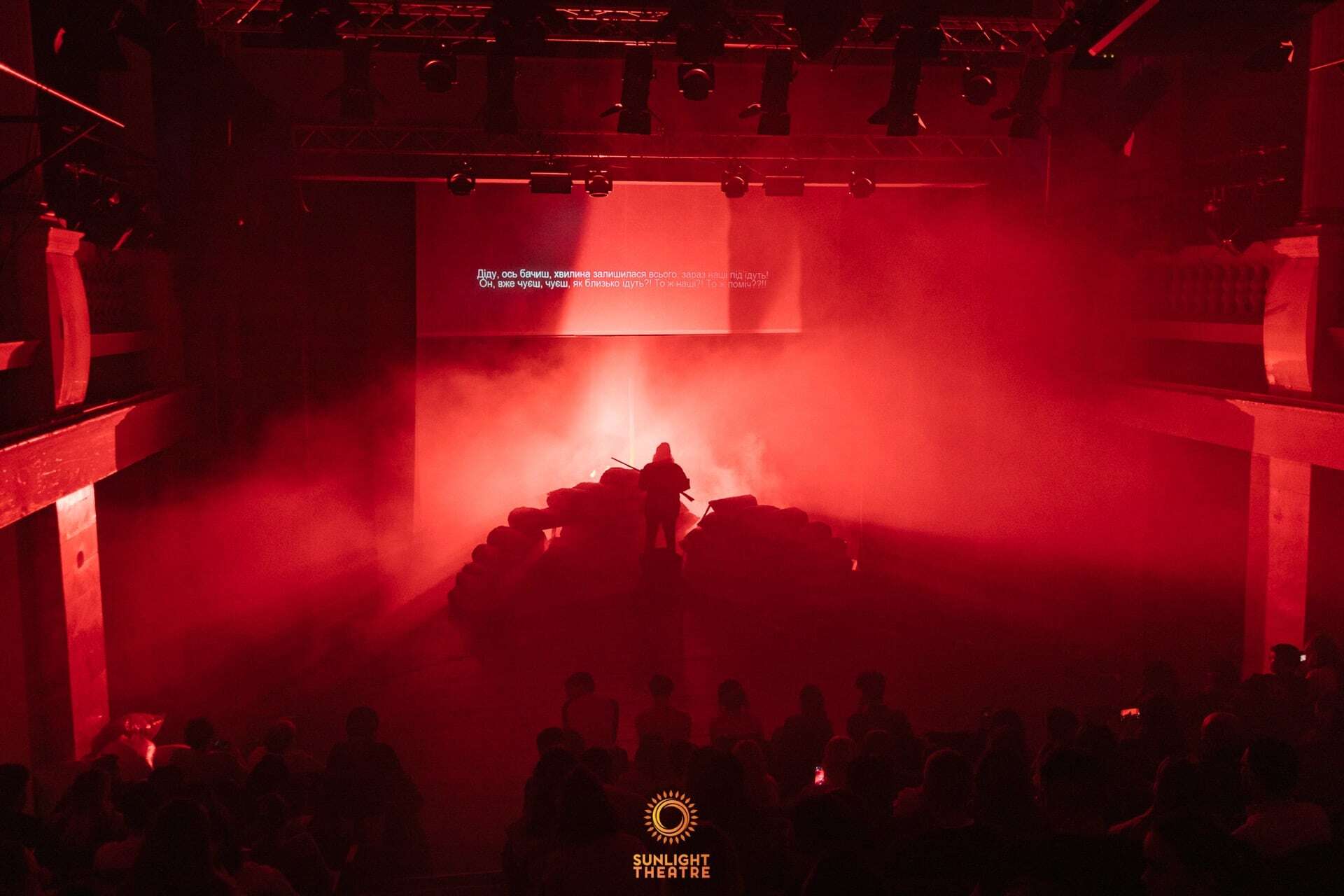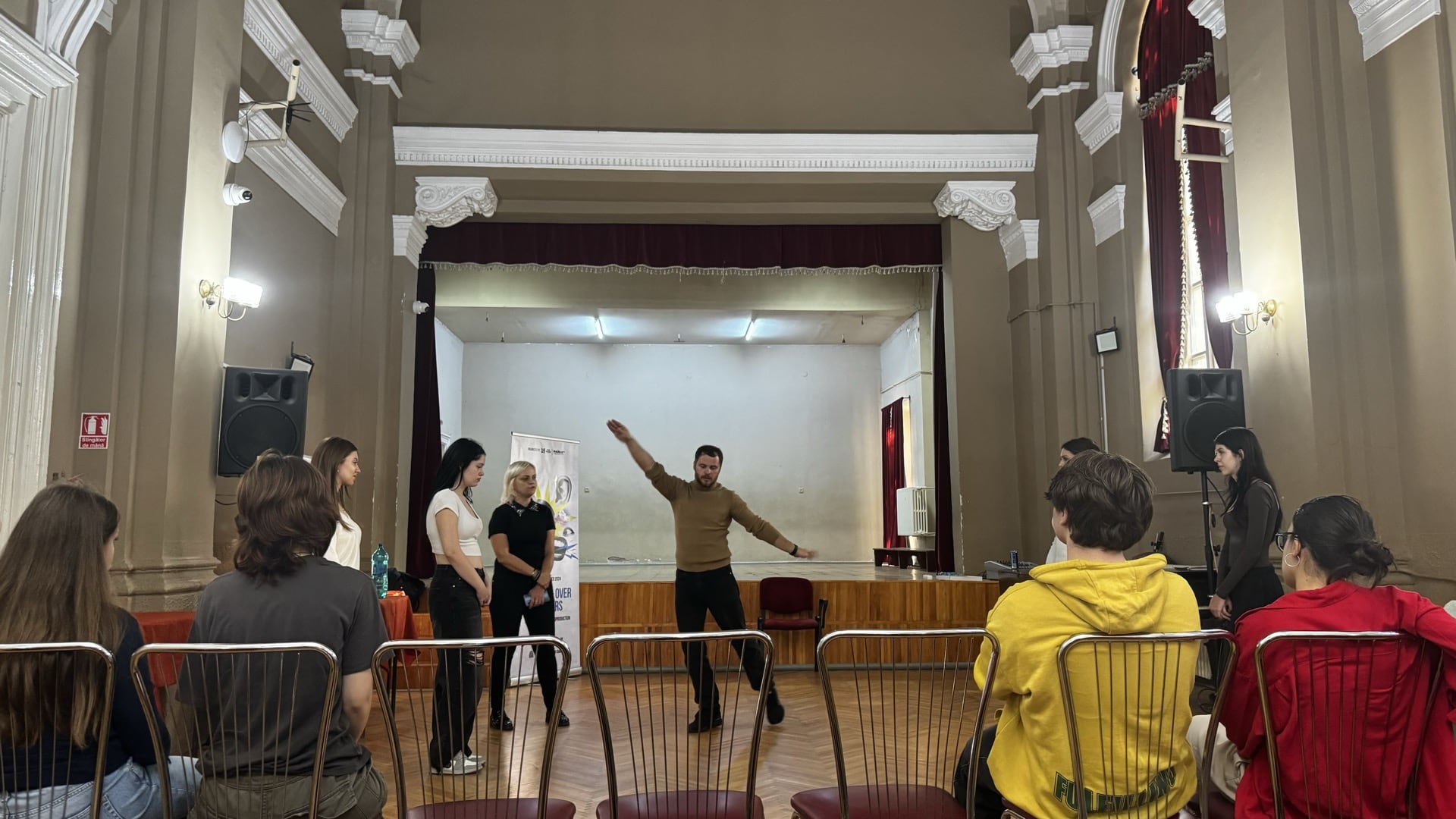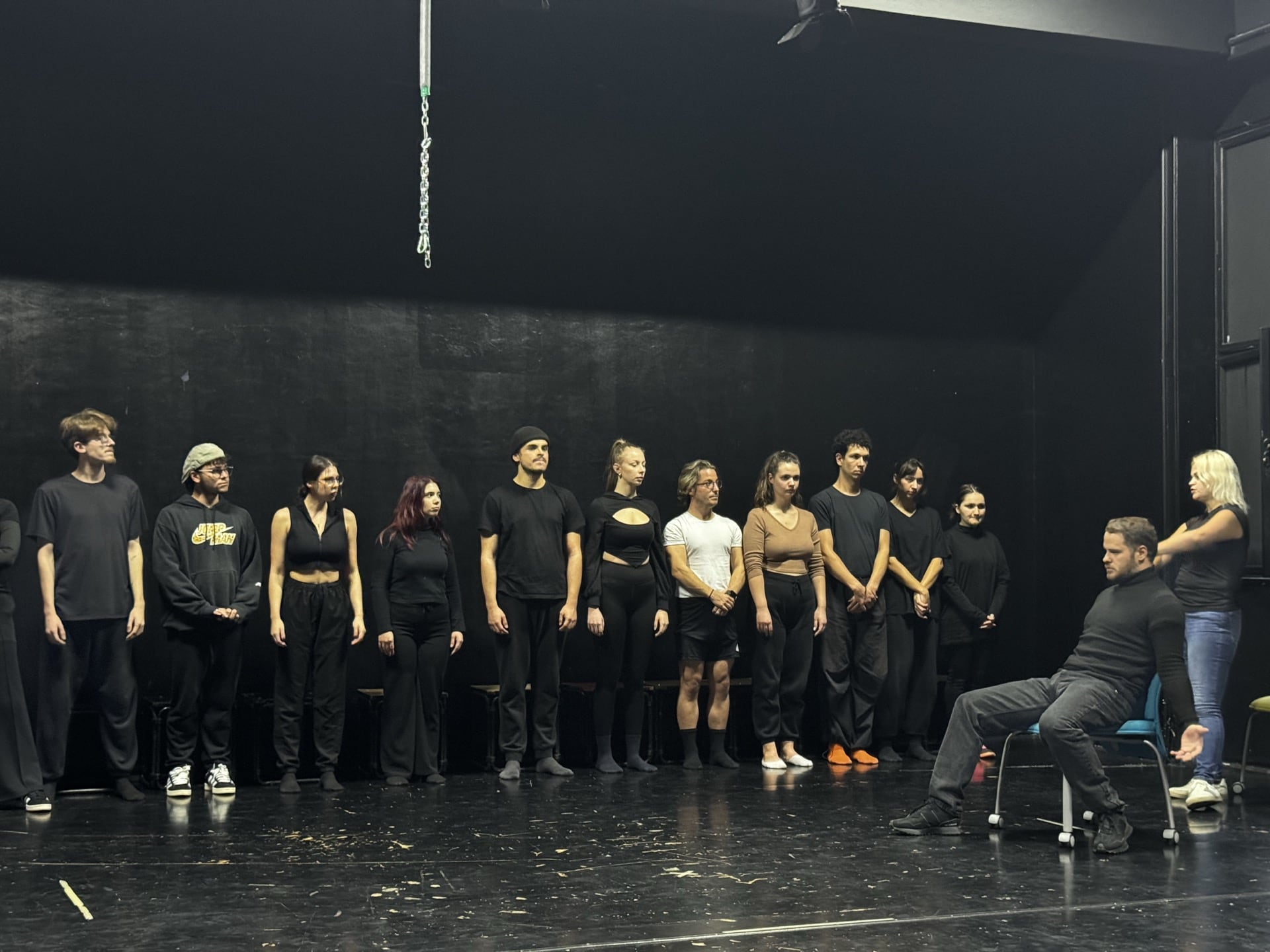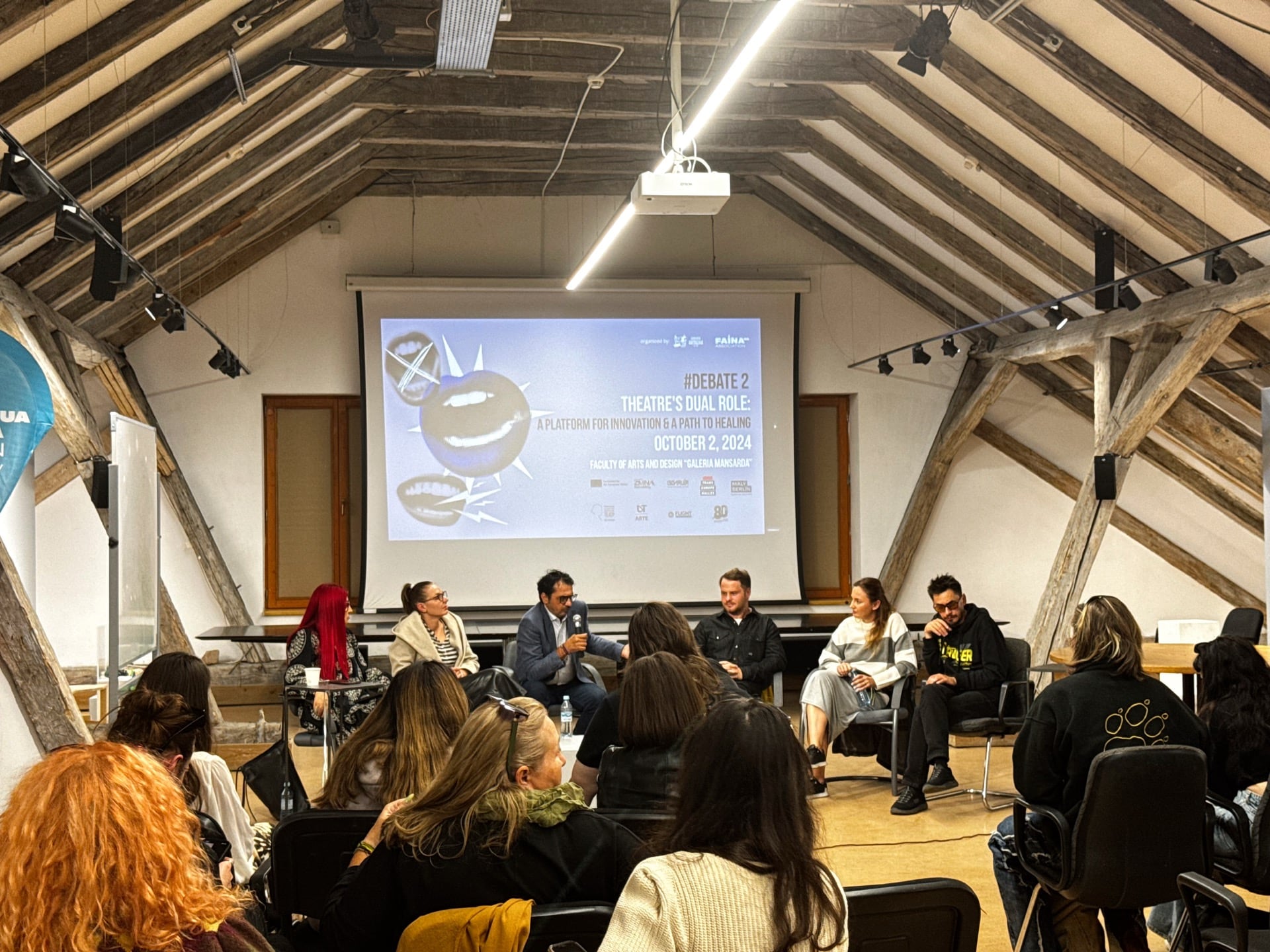ZMINA: Rebuilding - Sunlight Over Borders: Blockpost — A Play That Became a Movement

The audience stood in silence as the lights faded. Outside the theatre, the square near the Opera in Timișoara was already filling with people. They had just watched Blockpost—a searing play about war, loss, and resistance. Now they joined a growing protest sparked by the country’s controversial presidential election. In their hands were signs. On their phones, one word: #Blockpost.
What happens when art breaks through the stage and spills into the streets? When a theatrical performance becomes not just a cultural event, but a form of resistance?
This is the essence of Sunlight Over Borders—a powerful Romanian-Ukrainian theatre project that defies silence, borders, and indifference. Created by FAINA UA, the Ukrainian cultural NGO based in Timișoara, and the ARTMEDIA Cultural Foundation, the initiative builds bridges between communities through a shared exploration of war, memory, and identity.
Targeted at young people and the broader public in Timișoara—including Ukrainian refugees—the project created a space where pain can be collectively processed and where theatre became a medium for reflection, dialogue, and solidarity.
__resized.jpg)
The Birth of an Idea
The seeds of Sunlight Over Borders were planted long before the lights went up on stage. The project grew out of a long-standing collaboration between FAINA UA and ARTMEDIA—two organisations already experienced in fostering cultural dialogue. In recent years, they had worked together on music festivals, educational initiatives, and historical discovery tours in Timișoara, nurturing a space where art and civic engagement could meet.
A turning point came in 2023, when Timișoara was named European Capital of Culture. For Ana Maria Iacob, president of ARTMEDIA, the year offered an extraordinary platform and a chance to test the power of cross-border collaboration. One standout example was The Rules of the Game, a Norwegian-Romanian co-production that brought together artists from different backgrounds to explore universal themes through theatre. That experience—rich in lessons and best practices—was a foundation for something even more ambitious.
“We wanted to go deeper,” says Iacob. “To create not just another performance, but a moment. A context. A shared experience that would allow two countries to meet each other in a space of empathy.”
And so the idea was born: a Romanian-Ukrainian theatre project that would confront the most difficult of subjects—war—through a collaborative artistic process.
The concept was simple but bold: to unite students, professionals, and community members in a joint production of Blockpost, a contemporary Ukrainian play by Anton Nesmiianov, directed by Oleksandr Stepantsov. The goal wasn’t just to stage a play, but to start a conversation—onstage and off. With that, Sunlight Over Borders took shape: a co-production built on intercultural dialogue, youth engagement, and the healing potential of shared storytelling. Alongside the premiere, the project also included roundtables, public discussions, and theatre performances specially made for young audiences—extending the conversation far beyond the theatre walls.

Why Blockpost? A Play for Our Time
When the creators of Sunlight Over Borders set out to choose a play, they were looking for a statement—a theatrical act that would resonate across cultures, challenge audiences, and open up space for reflection. The answer came in the form of Blockpost, a contemporary Ukrainian play by Anton Nesmiianov.
Nesmiianov is one of the first Ukrainian playwrights to respond directly—and almost immediately—to the outbreak of the full-scale invasion in February 2022. Blockpost was written not as a retrospective or metaphor, but as a raw, urgent reaction to the war’s brutal new reality. Its characters are not historical symbols or abstract concepts—they are people we recognise: a grandfather, a nephew, a man who stayed, a woman who left and other “behavior model” roles.
“This play is not centered on individual trauma—it presents archetypes of behaviour, the range of human responses to war,” explains Eugenia Rozbytska, co-creator of the project.
“It’s not about one story, it’s about all of us. And that makes it universal.”
According to Eugenia, it was the first play written after the invasion started, hence capturing the emotional state of the nation in those first weeks and transforming it into something broader. The characters became emotional models—mirrors in which any audience could see themselves.
Though deeply rooted in the Ukrainian context, Blockpost is not bound by geography. Its emotional resonance and moral clarity cut across national lines. That is precisely why it was chosen—for its ability to make Romanian audiences feel not just sympathy, but recognition.
Language, Barriers, and the Power of Translation
Creating a joint theatrical production between Romania and Ukraine came with inevitable challenges. Language, culture, and aesthetics all had to be navigated carefully—but these very differences also became part of the project's strength.
The most immediate obstacle was linguistics. While many of the Ukrainian participants didn’t speak English or Romanian, many Romanian actors didn’t speak Ukrainian. According to Ana, to bridge this gap, the production relied on the exceptional skills of translator Lyudmyla Ganzha, who not only interpreted live interactions, but also worked closely with the team to ensure that emotional nuances weren't lost in translation.
The script itself was fully translated from Ukrainian to Romanian—a delicate process that demanded more than word-for-word accuracy. “The interplay between languages, translation, and adaptation can influence the dramaturgy,” says Ana Maria Iacob. “It’s a tension—you can’t just copy. But we wanted to stay as close as possible to the author's meaning, while ensuring the audience could connect emotionally.”
Another surprising discovery was the similarity in theatre training methods between the two countries. Despite speaking different languages, the actors and directors quickly found common ground in rehearsal techniques, stage logic, and artistic goals, which gave everyone a sense of trust and cohesion.
Of course, not all differences dissolved overnight. Romanian actors were used to more dynamic stage movement, while Blockpost is intentionally static—a tension-filled stillness that mirrors the psychological paralysis of war. Adapting to this slower rhythm required patience, but ultimately deepened the emotional weight of the performance.
What emerged was a bilingual, bicultural act of co-creation, where language was no longer a barrier, but a bridge. The addition of Ukrainian subtitles at the performances allowed refugee audiences to engage fully, while the Romanian translation brought the war’s emotional truth home to local spectators. And it is no wonder—
when you hear someone else’s story in your own language, it’s no longer ‘their’ war. It becomes your story, too.
__resized.jpg)
When the Stage Meets the Streets
In Timișoara, history has a habit of repeating itself—especially in moments when freedom is at stake. During the third and fourth performances of Blockpost, the city once again became a stage for political expression. Outside the theatre, people were gathering. The first round of Romania’s presidential elections had just ended in controversy, with an extremist candidate shockingly in the lead. In the streets, protests erupted. But this time, something unexpected happened: audience members who had just seen Blockpost joined the demonstrations—some holding signs, others sharing posts tagged with #Blockpost. A theatrical production about Ukraine’s war had, almost effortlessly, become a Romanian symbol of civil resistance.
This wasn’t just a coincidence. It was proof that theatre still has power—not just to entertain or inform, but to ignite. In the heart of Timișoara, near the Opera House where the 1989 revolution began, a new form of protest was taking shape: one built on empathy, cultural memory, and the urgency of the now. “During those performances, reality and theatre became completely intertwined,” recalls Eugenia Rozbytska. “People left the auditorium and walked straight into the streets.”
For Rozbytska and Iacob, this was a defining moment. A reminder that art—especially in times of polarisation and propaganda—matters nonetheless, being the “soft power of propaganda resistance” that Europe so desperately needs.
Building Bridges With Young Voices
One of the boldest aspects of Sunlight Over Borders was its decision to cast student actors—young performers still in training—as central figures in a play about war, trauma, and survival.
“ARTMEDIA has always believed in giving young talent a platform,” explains Ana Maria Iacob. “We’ve worked with students before. But this time, we wanted to go further and bring them into a professional production, give them real responsibility, and show what they’re capable of.”
Eight drama students and one high school student were selected through a rigorous casting process, supported by Romanian director Mirela Puia, who also teaches at the Faculty of Theatre and Music in Timișoara. The result was a cast that was raw, committed, and astonishingly effective.

“There was one role that didn’t quite click at first,” recalls Eugenia Rozbytska. “But then the director suggested a simple swap between two actresses—and suddenly everything made sense. Despite their age, these students inhabited the roles with remarkable depth.”
But the project was never just about the stage. From the start, Sunlight Over Borders was designed to engage the entire community—especially the Ukrainian diaspora. Since March 2022, Rozbytska and her team at FAINA UA have been building a network of support and cultural diplomacy for refugees in Timișoara. What began as a Telegram group called “Ukrainians in Timișoara” with over 1,350 members has grown into an official NGO.
By including Ukrainian subtitles, the performance ensured accessibility for refugee audiences. Roughly a quarter of all attendees were Ukrainians. For them, the experience was deeply emotional—a return to memories many would rather forget, but also a space to process them together.
Narratives of Hope: When Testimony Transforms Understanding
For many audience members, the performance of Blockpost was only the beginning. For many audience members, the journey into Blockpost began long before the curtain rose. In the weeks and months leading up to the premiere, a parallel space had already opened—one of reflection, testimony, and shared vulnerability. This space was Narratives of Hope.
Designed as a series of public discussions, these sessions brought together Ukrainians and Romanians for conversations about war, memory, and resilience. But they weren’t academic panels or formal Q&As. They were spaces of trust, where stories could be told honestly—and received without judgement.
For Eugenia Rozbytska, the most powerful moments often came from the unexpected. “At one session, three Ukrainian speakers had been scheduled to share their stories. But at the end, another man raised his hand. He hadn’t planned to speak. But something in the atmosphere moved him. He stood up and told us how he and his wife escaped from Bucha during the occupation.”

Moments like this transformed the room. The audience—mostly Romanian—was visibly shaken. These weren’t headlines. They weren’t distant reports. They were living people, standing just a few feet away, telling the truth as they lived it.
“The key insight,” says Rozbytska, “is how fast empathy can grow when people hear real stories in a safe space. The level of understanding deepens immediately.”
Or, as she puts it more simply:
When stories of war stop being just news on a screen and instead come from real, living people standing in front of you, it completely transforms the way people understand the war.
That’s what Sunlight Over Borders aimed to do—not just show a war, but humanise it. And in doing so, plant seeds of solidarity that no propaganda can erase.
One Message, One Mission
For those behind Sunlight Over Borders, the message is simple—war is not history. It’s happening now. And it demands not silence, but action. Art cannot stop missiles. But it can hold the line of truth, give voice to the silenced, and create spaces where pain becomes connection, and fear becomes empathy.
“We must talk about the war,” says Ana Maria Iacob. “Not tomorrow. Not later. Now—loudly, and every day. Ukraine must win, and it needs support to do so. Our puzzle piece is now in place, but so much more remains to be done.”
For Eugenia Rozbytska, the mission is just as clear:
Being Ukrainians abroad, it’s our choice—and our obligation—to build bridges. We must tell our stories, explain the truth, and show that this war is not just ours. It’s Europe’s too. And we must overcome it together.
Author: Mariia Akhromieieva
ZMINA: Rebuilding is a project co-funded by the EU Creative Europe Programme under a dedicated call for proposals to support Ukrainian displaced people and the Ukrainian Cultural and Creative Sectors. The project is a cooperation between IZOLYATSIA (UA), Trans Europe Halles (SE) and Malý Berlín (SK).